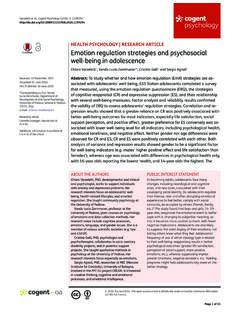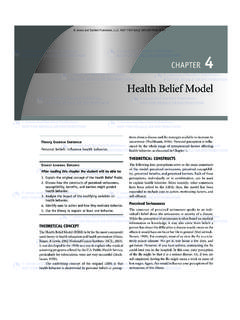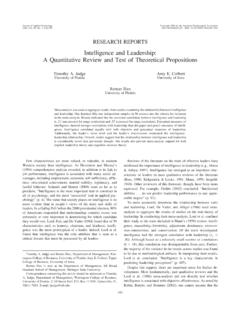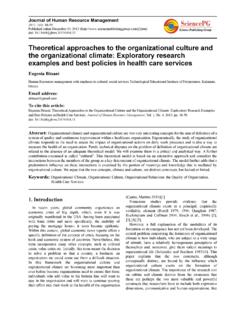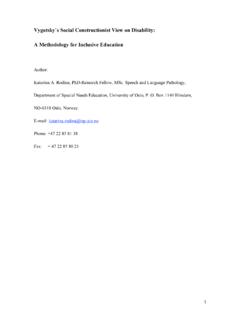Transcription of Transactional leadership and organizational …
1 Hussain et al., Cogent Business & Management (2017), 4: 1361663 | RESEARCH ARTICLET ransactional leadership and organizational creativity: Examining the mediating role of knowledge sharing behaviorSyed Talib Hussain1*, Jaffar Abbas1, Shen Lei1, Muhammad Jamal Haider1 and Tayyaba Akram1 Abstract: This study examines the role of Transactional leadership in creating the organizational creativity through knowledge sharing behavior between employees and leaders. The study explores the contingent reward as for knowledge sharing for orga-nizational creativity in organization, because many studies have been conducted for encouraging the knowledge sharing through contingent reward system.
2 But this study explores whether contingent reward system through Transactional behavior creates organizational creativity. So the data were collected from telecom sector. The total dis-tribution was 360 and questionnaire was collected from 308 but usable questionnaires were 300. For data analysis the CFA and SEM tests were applied. The results showed that Transactional leadership and knowledge sharing have positive relationship with creativ-ity, and knowledge sharing is mediating the role between Transactional leader and or-ganizational creativity. The theoretical framework will be used for future research of this paper to foster the extrinsic reward as exchange for knowledge sharing and creativity.
3 *Corresponding author: Syed Talib Hussain, Glorious Sun School of Business and Management, Donghua University, 1882, West Yan an Road, Shanghai, ChinaE-mail: editor:Tahir Nisar, University of Southampton, UKAdditional information is available at the end of the articleABOUT THE AUTHORSSyed Talib Hussain is enrolled in Doctoral Program in Glorious Sun School of Business and Management, Donghua University, Shanghai, China. His research focuses on leadership , change process, motivation, stress, conflict management, compensation & reward management in government and private Abbas is a research scholar in Donghua University. His research interests include business administration, HRM, Service quality, customer Lei is a faculty member at Glorious Sun School of Business and Management, Donghua University.
4 Her area of interest is marketing, human resource management Jamal Haider is a visiting lecturer of Economics and Finance in Center of International Programs (CIP) in Donghua University and PhD scholar in Glorious Sun School of Business and Management, Donghua University, Shanghai, China. His research areas are mobile banking, technology adoption, social capital, financial engineering, financial innovation, behavioral finance and consumer Akram is a PhD scholar at Glorious Sun School of Business and Management, Donghua University. Her area of interest is human resource management, marketing, social INTEREST STATEMENTSome of the international agencies have put Pakistan among top emerging economies and expect the country will grow rapidly during the days ahead.
5 Therefore, good leadership is essential to the numerous groups and organizations, to businesses and even to governments. However, we explain leadership in organizational perspective, which introduces organizational creativity and facilitate sharing of ideas, knowledge etc. This paper explains Transactional leadership style, knowledge sharing, and organizational creativity. Transactional behavior of leadership is likely to manage large corporations, or lead international projects that require rules and regulations to complete objectives on time. Therefore, this research may apply to small projects because these projects are vital to emerging economies. Transactional leadership has formal authority, and positions of responsibility in an organization and by then focuses on results, and measures success on rewards system of organization and responsible for managing individual performance and facilitating group performance in : 28 March 2017 Accepted: 20 July 2017 First Published: 01 August 2017 2017 The Author(s).
6 This open access article is distributed under a Creative Commons Attribution (CC-BY) 1 of 11 Page 2 of 11 Hussain et al., Cogent Business & Management (2017), 4: 1361663 : leadership ; Human Resource Development; organizational ChangeKeywords: Transactional leadership ; knowledge sharing behavior; organizational creativity1. IntroductionThe leadership styles enjoyed more attention in 1970s, creativity in 2000s and currently knowledge sharing behavior between employees and leaders is the central theme of this research, but the ques-tion needs to be answered, are leaders prepared to share knowledge for organizational creativity in organizations? Yes, transformational behavior of leadership is the leading theme in previous re-search (Bass & Riggio, 2006) and Transactional behavior leadership style is largely ignored for inno-vation and creativity but the meta analyses have strongly predicted the Transactional leadership for employees motivation, leader effectiveness and satisfaction (Judge & Piccolo, 2004).
7 The transac-tional leadership style played an active role in strategic leadership for organizational effectiveness. In today s organizations, the Transactional leadership is universal than any other supportive leader-ship behavior (Waldman, Rammirez, House, & Puranam, 2001), so this study is being extended for existing leadership literature for the role of Transactional leadership in organizational creativity through knowledge generate new ideas, new ways of problem-solving, negotiate, communicate, collaborate, and oftentimes these are distributed in organization and transformed into shared practices and routines. For this purpose an important determinant of an organization is considered because the behaviors may affect the components (innovation, ideation, and problem-solving) of creativity (Amabile, 1983).
8 Thus organizational leaders need to be creative and manage such climate in or-ganization which promotes creativity and innovation (Osborne, 1998). The leaders of an organiza-tion develop the creative ideas lead to innovative services and products (Yuan & Woodman, 2010) and it may gain the competitive advantage over (1996) has defined creativity in workplace as the process where employees in the organi-zation generate ideas to create, improve, or modify the organizational products, procedures, or poli-cies. The leaders may instantly settle on new ideas, locate the specific goals, initiatives for innovation from subordinates, so leadership style was underlined as the most important factor of individual influence for innovation (Harborne & Johne, 2003).
9 Bello, Lohtia, and Sangtani (2004) argued that firm innovation through market orientation to be recognized essentially and widely for the organiza-tion to growth and survive. Creativity brings innovation which is an important factor for the organi-zational competition and success (Woodman, Sawyer, & Griffin, 1993). The current economy showed an importance of knowledge which Hargadon (1998) called as knowledge broker firms and Robertson (2002) called as knowledge map. In organizational success the continuous knowledge management may play an auspicious role in problem-solving, maintaining, applying, and locating the knowledge (Alavi & Leidner, 2001). So without the contribution of employees, organizations are not able to bring creativity in the organization (Lahti & Beyerlein, 2000).
10 If employees have knowledge, that is more beneficial than the stored data of the organization s information system. As the study of Bock, Zmud, Kim, and Lee (2005) explored, knowledge sharing as the main process needs to be supported by all of the organizational study explores the relationship between Transactional leadership and organizational creativ-ity in knowledge sharing context. Our understanding of management of innovations comes from sketches, with few methodical studies. Despite a research on Transactional leadership , knowledge sharing and organizational creativity, a literature review shows merely little proportion of leadership studies have been investigated in Transactional leadership or context; while a number of studies have been conducted about the broader theories of leadership , such as transformational leadership theory, democratic, charismatic etc.



